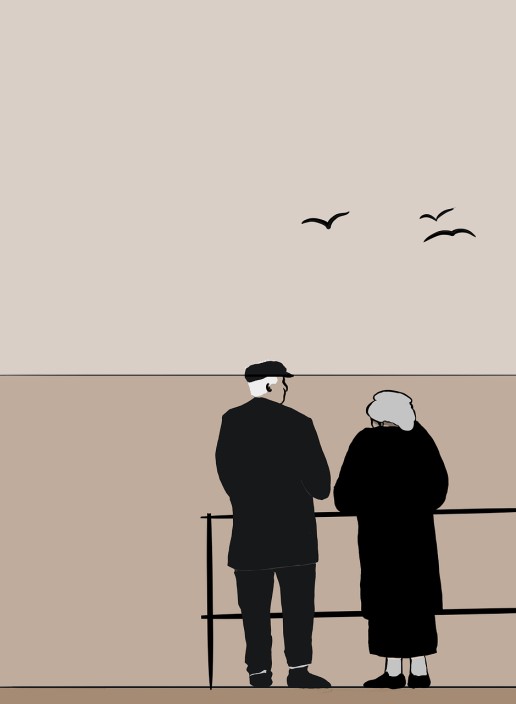
In “A Man Called Ove” by Fredrik Backman, several themes are interwoven throughout the narrative, offering readers profound insights into the human experiences, giving a realistic account of the complexities of love, loss, and personal transformation to the enduring power of human connections and the significance of memories. The novel delves deep into the intricate layers of life’s experiences. Through the lives of its characters, the story explores these themes with both heartwarming tenderness and thought-provoking depth, inviting readers to reflect on the universal aspects of the human journey.
A Man Called Ove | Themes
Fairness and Loyalty
Fairness and loyalty are fundamental principles that drive the character of Ove. From his early years, Ove’s father instills in him the importance of these values. Ove learns that it’s crucial to act fairly and honorably, even when the outcome may not be in his favor. His commitment to these principles forms the basis of his identity, guiding his actions and shaping his relationships.
Throughout the novel, Ove’s unwavering dedication to fairness becomes evident in his interactions with various characters. He values doing things correctly and taking pride in a job well done over personal gain. Ove’s commitment to principles is portrayed as a distinctly masculine quality, reinforcing his belief that men understand the importance of these values better than women. He often contrasts his principled approach with what he perceives as a lack of understanding of women.
However, Ove’s rigid adherence to these principles sometimes leads to conflicts, particularly with individuals who have a more flexible approach to life. His interactions with his neighbor, Parvaneh, highlight the tension between Ove’s unwavering principles and the need for adaptability and pragmatism in certain situations. Ove’s devotion to Saab cars symbolizes his loyalty to the brand and, by extension, his commitment to his family. In contrast, Rune’s decision to buy a BMW sports car is seen by Ove as a betrayal of loyalty, since the car is incapable of seating children it is seen as a direct portrayal of ignorance of family, leading to a rift in their friendship.
As the novel progresses, Ove’s experiences challenge his rigid principles. He learns that while principles are admirable, they must be balanced with pragmatism. He starts to change and understand the complexities of social interactions and gradually learns to deal with them effectively. Ultimately, the theme of fairness and loyalty underscores the importance of finding a harmonious balance between unwavering principles and the ability to adapt to changing circumstances.
The Role of Memories & Grief
The theme of memories permeates the narrative highlighting their profound impact on the protagonist’s life. Ove carries with him a treasure trove of memories that serve as both a source of comfort and a burden. Memories shape his perceptions, decisions, and emotions, ultimately guiding the trajectory of his life.
From his early memories of his father’s kindness and integrity, Ove develops a deep-seated belief instilled by his father, the importance of living by a set of principles. His father’s legacy instills in him a commitment to fairness and an understanding that actions speak louder than words. Ove’s adherence to these principles becomes a defining characteristic, driving his interactions and judgments of others.
Throughout the novel, Ove’s experiences demonstrate the dual nature of memories. Positive memories offer guidance and inspiration. Ove’s memories of Sonja motivate him to live according to the values she cherishes. Her influence encourages him to embrace life’s spontaneity and consider alternative perspectives. However, memories are not always a source of solace. Painful recollections of humiliation and betrayal fuel Ove’s resentment and contribute to his reputation as a curmudgeon. These negative memories become obstacles in his relationships and interactions with others.
The novel also underscores the danger of dwelling too extensively on memories. Ove’s grief over the loss of Sonja becomes all-consuming, leading him to contemplate suicide as a means to reunite with her in the afterlife. This extreme response reveals the potential pitfalls of allowing memories to dominate one’s existence. In the end, the novel suggests that memories can be harnessed positively. Ove’s transition from isolation to community is facilitated by the memories of Sonja, who encouraged him to embrace life’s spontaneity. Her memory serves as a catalyst for Ove’s transformation, pushing him to adopt a more open-minded perspective and consider alternative ways of living. Often he starts questioning what she would do in such situations and carries out all behavior guided by her principles. Moreover, the collective memories of the community members who rally around Ove demonstrate the potential for memories to unite people and inspire positive change, portraying memories as a powerful force, capable of both constraining and liberating individuals, depending on how they are channeled and integrated into one’s life.
The Importance of Community
The novel also explores the significance of community in shaping the life of the protagonist, Ove. The novel introduces Ove as a solitary and isolated individual, emphasizing his self-imposed exile or isolation from society. However, as the narrative unfolds, Ove’s journey highlights the transformative power of community and human connections.
Ove’s rigid adherence to his principles and his fixation on past memories contribute to his self-imposed isolation. He distances himself from others, believing that his way of life is incompatible with the modern world. This isolation deepens his grief and pushes him toward thoughts of suicide as he seeks to reunite with his late wife, Sonja, in the afterlife. Parvaneh, his new neighbor, disrupts his carefully structured routine and introduces him to a diverse group of people. Initially resistant, Ove gradually discovers that the support and camaraderie of this community offer him a renewed sense of purpose and belonging.
The community members, each with their unique backgrounds and quirks, challenge Ove’s preconceived notions and soften his harsh exterior. They become his lifeline, providing assistance, friendship, and moments of laughter. Parvaneh, in particular, emerges as a force of change in Ove’s life, showing him the value of flexibility and the importance of accepting help from others. Furthermore, the community rallies behind Ove when he faces challenges, such as preventing his friend Rune from being placed in an assisted living facility. This collective effort illustrates the strength of community bonds and the capacity for individuals to come together to make a positive impact.
As the novel progresses, Ove’s transformation from a recluse to a cherished member of the community becomes evident in instances where he provides relationship advice to Adrian, to the trust he builds with his neighbors who now seek his guidance constantly. His role evolves from that of a grumpy neighbor to a beloved figure who offers guidance, support, and a sense of belonging to others. Ove’s integration into the community allows him to experience a sense of fulfillment and purpose that he cut off from after his wife’s death.
The Complex Nature of Grief and Loss
Grief and loss are central to Ove’s character and the overall narrative of the novel. The story portrays the complex and multifaceted nature of grief, emphasizing its enduring impact on the human psyche. Ove’s grief over the loss of Sonja is not a one-dimensional emotion but rather a rich tapestry of feelings that evolve throughout the story.
In the early chapters, we witness Ove’s daily visits to Sonja’s grave. These visits, coupled with his insistence on maintaining their home exactly as she left it, signify the depth of his grief. They also reveal the different stages of grief, from denial and anger to depression and acceptance. Ove’s refusal to let go of Sonja’s memory underscores how grief can become an integral part of one’s identity.
The theme of grief is further explored through Ove’s relationship with Rune, his former best friend and neighbor. Rune’s struggle with Alzheimer’s disease and his gradual loss of memory represents a different facet of grief, one that pertains to the painful process of witnessing a loved one’s decline. Ove’s unwavering visits to Rune, even when Rune no longer recognizes him, poignantly convey the enduring bond of friendship and the heartache of witnessing the erosion of memory and identity.
“Loving someone is like moving into a house… for its imperfections. You get to know all the nooks and crannies. How to avoid getting the key caught in the lock when it’s cold outside,”
Sonja’s metaphorical comparison of love to living in a house highlights how grief is not just about mourning but also about cherishing the memories and imperfections of the loved one.
The quote, “But if anyone had asked, he would have told them that he never lived before he met her. And not after either,” further emphasizes the intensity of Ove’s grief and his sense of emptiness after Sonja’s passing. It underscores that grief is not just about mourning but also about the profound impact a loved one has on one’s life, even in their absence.




